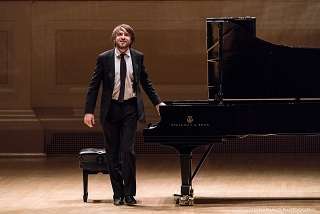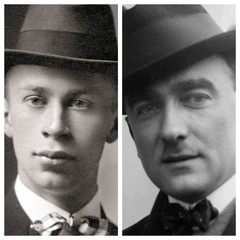|
Back
The Power and the Glory New York
Stern Auditorium, Carnegie Hall
03/03/2022 -
Karol Szymanowski: Piano Sonata No. 3, Opus 36
Claude Debussy: Pour le piano
Sergei Prokofiev: Sarcasms, Opus 17
Johannes Brahms: Piano Sonata Number 3 in F Minor, Opus 5
Daniil Trifonov (Pianist) 
D. Trifonov (© Steven Pisano)
“Of course I have used dissonance in my time, but there has been too much dissonance. Bach used dissonance as good salt for his music. Others applied pepper, seasoned the dishes more and more highly, till all healthy appetites were sick and until the music was nothing but pepper.”
Sergei Prokofiev (1891-1953)
“The sound of the sea, the curve of a horizon, wind in leaves, the cry of a bird leave manifold impression in us. And suddenly, without our wishing it at all, one of these memories spills from us and finds expression in musical language...I want to sing my interior landscape with the simple artlessness of a child.”
Claude Debussy (1862-1918)
Outside of a pair of hands that would make Gargantua blush with humility, Daniil Trifonov, in his first New York recital since the Plague Year, could have been a corporate executive. He casually walked on the stage, played three post-Romantic pieces, walked off, played Brahms Third Piano Sonata, was hailed and after a few bows, farewelled.
But what hands! What power came out of a mere ten fingers! An artist like Mr. Trifonov doesn’t need an actor’s artifice or a wunderkind’s blatant joy. Beginning with an insanely difficult, rarely played Polish sonata, Mr. Trifonov continued without a moment’s difficulty. His power whether digital or mental, was unceasing.
That opening Karol Szymanowski Third Sonata doesn’t fit into any “school” of music. Those four connected movements are dazzling, Mr. Trifonov’s touch was impeccable. The hands enveloped the keyboard, the first section with its contrapuntal dissonances, its themes within themes, was like a Liszt virtuoso piece for 20 fingers–with the harmonies of Scriabin. And in the second movement, Chopin as a romantic dream–with 20th Century harmonies.
Nobody could prepare for Szymanowski’s final fugue, which arrived almost abruptly. While the voices multiplied, Mr. Trifonov somehow managed clarity, the theme of the fugue ceaselessly on top of what could have been a morass of keys.
One might have expected a contrast with the following Debussy Pour le piano, but the opening movement was executed with the same insistence, those harp-like glissandi and the cadenza played faultlessly but coldly.
Mr. Trifonov settled down for the Sarabande, actually enjoying the 18th Century moods, the Couperin-style turn of phrasing. The final Toccata was meat for Mr. Trifonov’s legerdemain.

S. Prokofiev/K. Szymanowski
To label Sergei Prokofiev’s five movements Sarcasms seems a duplication, like calling Eroica “heroic”. Outside of the pablum he wrote for Stalin, Prokofiev was always on the edge of sarcastic composition or irony or musical poisoning. Yet his Sarcasms were like four sharp knives cut into the keyboard, each with the cuts bloodied into a trio of sections.
Mr. Trifonov knew all the serrated edges and played them not with auditory brutality, but allowing the composer to dazzle with repeated thirds, with “wrong note” themes plunging into deeper chasms. The final piece was less sarcasm than obsequy. The pianist ceased the satire (was that Stravinsky in the first one?) and descended from the whirls of a Precipitosissimo the piano’s darkest tones, ending basically in a satirist’ hell.
This first half of the program consisted of magic: the magic of Szymanowski’s manic convolutions, of Debussy’s magical time trip and Prokofiev’s samurai style thrusts and blood.
The second half could not have had a greater contrast. Brahms’ long (but never overlong) Third Sonata. The second movement and the intermezzo were played with all the necessary poetry. For the rest, Mr. Trifonov used more power than poetry. Even the innocence of the first movement had an inner volition, while the finale was, yes, graceful when needed, but explosive when called for, with Mr. Trifonov’s impeccable finger work and the most intensive emotion.
Harry Rolnick
|